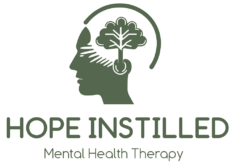DEPRESSION THERAPY IN NEW JERSEY
Depression is a widespread mental health condition that affects many individuals. Since it doesn’t present the same way for everyone, a person may be struggling with depression without even realizing it. Many people endure depression unnecessarily, even though help is within reach. The impact of depression can be overwhelming, touching every part of a person’s life — from family and work to finances, friendships, and spiritual well-being.
The encouraging news is that depression is highly treatable with the right support. At Hope Instilled, our therapists are dedicated to helping you find a treatment plan that suits your unique needs.
SEEKING HELP FOR DEPRESSION IN NEW JERSEY
If you or someone you care about is experiencing any of these symptoms, seeking a professional evaluation and treatment is strongly encouraged.
At Hope Instilled, we understand that your mental health is essential, and we’re here to help you tap into its strength so you can live a happier, more fulfilling life. You are more than just a case file to us — we reject one-size-fits-all solutions for treating depression.
We believe mental health care should be accessible, personalized, and welcoming for everyone who needs support.

Schedule a Free 15 Minute Consultation Today
There’s no reason to delay. Connect with Hope Instilled today, and take a step towards your mental health goals. We’ll be happy to take your call.

- Fill out the form on our Contact Page and we’ll gather some information and set up a 15 minute call with a therapist.
- Attend your 15 minute welcome call. You’ll have a consultation where you can share how you’re feeling and decide on the next steps together.
- Make Progress & Feel Better – Work with me to resolve your mental health issues and become more confident in yourself.
- Aftercare – I would love to say that every success is permanent. However, life has its detours which may lead you back to me for a return visit. It’s OK, we would love to chat again and help you get back on the road to mental wellness.
Frequently Asked Questions
You might be dealing with a depressive disorder if you recognize these symptoms in yourself:
Persistent feelings of sadness, anxiety, or emotional emptiness
Loss of interest or pleasure in activities once enjoyed, including sex
Changes in appetite or weight not related to dieting
Significant changes in sleep patterns
Fatigue or a noticeable decrease in energy
Difficulty concentrating, remembering things, or making decisions
Feelings of hopelessness or pessimism about the future
Ongoing feelings of guilt, worthlessness, or helplessness
Frequent thoughts of death, accidental harm, or suicidal planning or attempts
Unexplained chronic aches and pains not linked to any known physical condition
There are several types of depression, including major depressive disorder (MDD), persistent depressive disorder (PDD), bipolar disorder, seasonal affective disorder (SAD), and postpartum depression (PPD). Each type has its own symptoms and treatment approaches.
Diagnosing depression usually requires a comprehensive assessment by a mental health professional. This process often includes a review of your symptoms, medical history, and, in some cases, lab tests to rule out other medical conditions. Depression can arise from a mix of genetic, biological, environmental, and psychological influences. Additionally, stressful life events, trauma, chronic illnesses, and certain medications may increase the risk of developing depression.
Yes, depression is highly treatable, and many individuals experience significant relief through therapy, medication, or a combination of both. Seeking professional support and creating a personalized treatment plan is essential for effectively managing depression.
Treatment options may include psychotherapy, medications, lifestyle adjustments, and alternative therapies. Common approaches such as cognitive-behavioral therapy (CBT), antidepressants, and positive therapy practices are often used to help individuals manage their symptoms and improve their well-being.


